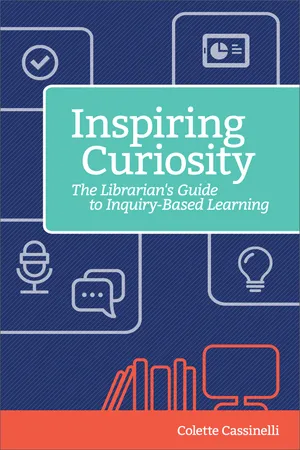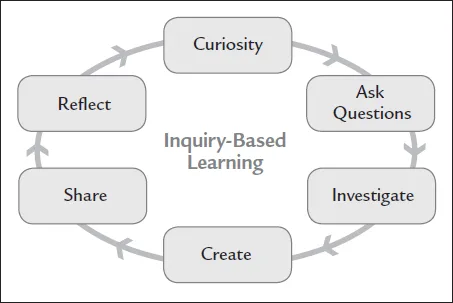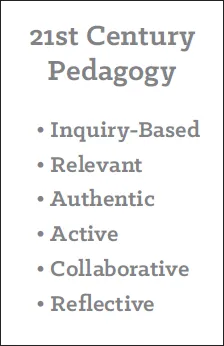
eBook - ePub
Available until 26 Feb |Learn more
Inspiring Curiosity
The Librarian's Guide to Inquiry-Based Learning
This book is available to read until 26th February, 2026
- English
- ePUB (mobile friendly)
- Available on iOS & Android
eBook - ePub
Available until 26 Feb |Learn more
About this book
This practical resource for secondary school librarians offers guidance for collaborating with teachers and students to develop inquiry-based research projects.
With success stories from librarians all over the U.S. illustrating how they’ve guided teachers and students through the research process, this book provides strategies for using memorable events to activate students’ natural curiosity and activities for generating essential questions for exploration.
The book includes:
Written for librarians by a librarian, this book will help librarians collaborate with classroom teachers on inquiry projects and offers new ideas and insights to inspire them in the process.
Audience: 6-12 school librarians
With success stories from librarians all over the U.S. illustrating how they’ve guided teachers and students through the research process, this book provides strategies for using memorable events to activate students’ natural curiosity and activities for generating essential questions for exploration.
The book includes:
- Ideas and resources to help librarians be more effective in research and inquiry.
- Tips for developing search strategies, locating and curating resources, evaluating sources and celebrating students’ inquiry beyond the traditional research paper.
- Lessons and assessment ideas to keep librarians current on information literacy topics.
Written for librarians by a librarian, this book will help librarians collaborate with classroom teachers on inquiry projects and offers new ideas and insights to inspire them in the process.
Audience: 6-12 school librarians
Frequently asked questions
Yes, you can cancel anytime from the Subscription tab in your account settings on the Perlego website. Your subscription will stay active until the end of your current billing period. Learn how to cancel your subscription.
No, books cannot be downloaded as external files, such as PDFs, for use outside of Perlego. However, you can download books within the Perlego app for offline reading on mobile or tablet. Learn more here.
Perlego offers two plans: Essential and Complete
- Essential is ideal for learners and professionals who enjoy exploring a wide range of subjects. Access the Essential Library with 800,000+ trusted titles and best-sellers across business, personal growth, and the humanities. Includes unlimited reading time and Standard Read Aloud voice.
- Complete: Perfect for advanced learners and researchers needing full, unrestricted access. Unlock 1.4M+ books across hundreds of subjects, including academic and specialized titles. The Complete Plan also includes advanced features like Premium Read Aloud and Research Assistant.
We are an online textbook subscription service, where you can get access to an entire online library for less than the price of a single book per month. With over 1 million books across 1000+ topics, we’ve got you covered! Learn more here.
Look out for the read-aloud symbol on your next book to see if you can listen to it. The read-aloud tool reads text aloud for you, highlighting the text as it is being read. You can pause it, speed it up and slow it down. Learn more here.
Yes! You can use the Perlego app on both iOS or Android devices to read anytime, anywhere — even offline. Perfect for commutes or when you’re on the go.
Please note we cannot support devices running on iOS 13 and Android 7 or earlier. Learn more about using the app.
Please note we cannot support devices running on iOS 13 and Android 7 or earlier. Learn more about using the app.
Yes, you can access Inspiring Curiosity by Colette Cassinelli in PDF and/or ePUB format, as well as other popular books in Education & Education Standards. We have over one million books available in our catalogue for you to explore.
Information
Topic
EducationSubtopic
Education Standards
CHAPTER 1
Creating A Schoolwide Culture of Inquiry
One afternoon in the school library, I had a casual conversation with one of my students that led her down an interesting line of inquiry. Kate, a senior in the IB history class at Sunset High School, was talking about her upcoming Internal Assessment (a historical assessment). Kate was considering the topic of occupied France during WWII for her senior history research project. She had developed an interest in the topic during her junior year, after reading the novel All The Light We Cannot See by Anthony Doerr. She was doing some background reading to get a sense of the issues during the time period.
I shared that my own father had been a teenager during WWII, and his family had been evicted from their home in Vire, France, in 1943. Their home had been occupied by the German army for two years, so the family moved in with my father’s grandmother. One can imagine the turmoil.
Kate was genuinely interested, so I also shared that my uncle still had a journal of his experiences that he had written in secondary school. We discussed how smart it was of my uncle’s forward-thinking teacher to ask students to reflect on their experiences. Eventually, I asked Kate if she would she be interested in a video recording of my uncle reading from his journal and reminiscing with my father about growing up in the Normandy region. Kate said yes, so I sent her the YouTube video and directed her to print and online sources from our school library to get her started.
Kate’s history teacher encouraged the class to take advantage of the local public library to locate academic journals and primary source documents using the JSTOR database. Kate visited Multnomah County Library and worked with a librarian there to reserve some titles. After some initial research, she was leaning toward the idea of how French identity changed during the occupation. “All of my background research has made me more confused, and I am trying to work out those ideas. It’s still kind of murky,” she reported after a week.
Kate experienced the natural uncertainty that occurs when a student has some solid research but hasn’t adequately narrowed a research question. I encouraged Kate to look at sources outside of the American view of the war and see if she could find stories or speeches from the French resistance, perhaps newspapers or artifacts from a French museum, or the World Digital Library. Exploring the psychology of how culture is formed and how people under siege maintain a sense of self piqued her interest, and Kate produced even more questions and ideas. She was well on her way to becoming a curious researcher.
Inquiry-Based Learning
Kate’s story illustrates the transformational experience of a student personally engaged in authentic inquiry-based learning. Curiosity fuels students’ passion to make connections with topics that are meaningful and real. By engaging in deep thinking and asking thought-provoking questions, students are challenged to consider new perspectives. Kate was offered plenty of choice and autonomy in selecting her topic, but it was her personal interest that made the difference. A hallmark of inquiry-based learning is that students’ own driving questions propel their research. That spark of curiosity bridges the gap between what they know and do not know. Learners steer the direction of their inquiry as they consider the best way to uncover stories or unexpected ideas. Compare Kate’s situation to the chorus of groans when a teacher assigns everyone to investigate a specific topic. Provocative and open-ended inquiry asks students to respond and think critically. As the research progresses, students organize and unpack information to assimilate new concepts. Notice how Kate leveraged the resources of her public library to gain additional sources beyond her school library. Using inquiry-based learning, students conduct interviews, formulate opinions, defend stances, or develop creative solutions connected to their original questions. Students are provided opportunities to present what they learned through writing or multimedia channels. Students may feel compelled to take action or extend their research to the community. Finally, inquiry-based learners reflect on what they have learned and accomplished. I was thrilled that my family history resonated with Kate and helped move her research forward. Inquiry-based learning is more than a research paper or asking questions at the beginning of a unit. It requires students to take on the researcher’s mindset and internalize concepts for themselves. Who knows? Long after her assignment is complete, this inquiry project may kindle Kate’s desire to know even more about life during WWII.

Figure 1.1. Elements of Inquiry-Based Learning.
Librarian’s Role
What is the school librarian’s role throughout the inquiry-based learning experience? How can we impact the learning experience for our students and make a difference? I will provide inspiring stories and practical examples of how school librarians can become essential members of an instructional team by moving beyond the basics of teaching students how to access and evaluate sources.
Not every inquiry-based lesson will develop into an in-depth research project or essay. Many will result in engaging Socratic seminars where students debate and explore ideas with their classmates. Other inquiry-based lessons might lead students to investigate science phenomena or the creation of “wonder walls” to document new questions of inquiry. I am interested in finding those key entry points where librarians can insert themselves into inquiry-based lessons and offer expertise and insights unique to our positions. Librarians can do more than just guide learners toward digital and print sources. We work directly with every student and every teacher in our school. We see the bigger picture and can view the landscape of our school through the lens of inquiry. We can influence the tone and direction of how students see themselves as researchers. In collaboration with your administration and faculty, examine your school’s curriculum and identify entry points where you can play a crucial role in shaping secondary students to be career and college ready. Not every experience will have a personal connection like Kate had with me, but every librarian can focus on personalized learning and ensure we are preparing teens for their future.
Digital Age Pedagogy
Our challenge as educators is to propel the pedagogical shift forward, toward a culture of innovation and creativity. Traditional approaches that emphasize memorization or “looking up” facts do not strengthen critical thinking skills. It is no longer acceptable to have students recall names, dates, and figures when many teens have access to this digital content at their fingertips. The world has changed, and every major institution is quickly evolving. Chris Bick, Vice Principal at Sunset High School, reflects, “No one benefits from the nostalgic view of their own childhood education. We will not be preparing kids for the world that they are destined to inherit if we continue to stand still.” (C. Bick, personal communication, November 16, 2017) A culture of innovation—a way of doing things new and better—needs to pervade every single lesson. Bick suggests librarians work intentionally with their faculty in moving this dial forward. When librarians collaborate with classroom teachers, they can be “that innovative thinker that makes sure a picture of that future is painted with great clarity.” (2017)

Figure 1.2. 21st Century Pedagogy.
Inquiry-based strategies are a significant facet of a twent first century pedagogy (see Figure 1.2). Giving students agency (control over what they experience) changes their self-image from passive receivers of information to leaders who are invested in their own learning. Student’s questions and intense curiosity drive learning forward. Authentic inquiry will not only engage students but develop higher-order skills and present them with opportunities to communicate effectively to a wide range of audiences. All students need to feel empowered and to know they can make a difference. Inquiry-based projects that ask students how they can serve others will build empathy and compassion.
Tony Wagner, Ed.D., Expert in Residence at Harvard University’s Innovation Lab states,
The capacity to innovate—to solve problems creatively or to bring new possibilities to life—is the single most important competitive advantage for individuals and organizations. In today’s world, it is not what you know—it’s what you can do with what you know. (2012b)
Wagner has identified seven survival skills for success (2017), as defined by business leaders:
1. Critical thinking and problem solving
2. Collaboration across networks and leading by influence
3. Agility and adaptability
4. Initiative and entrepreneurship
5. Effective oral and written communication
6. Accessing and analyzing information
7. Curiosity and imagination
To reshape education toward a culture of innovation, we need to move away from compartmentalized knowledge toward collaboration and sustained opportunities for multidisciplinary problem solving. How do we shift our secondary students from compliance to engagement to empowerment? Inquiry-based learning demands that students ask hard questions and embrace uncertainty. How do we create a culture of risk taking that fosters intrinsic motivation among our teens? Schools with a culture of innovation “teach students to view trial and error—and failure—as integral to the problem-solving process.” Do we provide opportunities to create and use their knowledge in applied contexts? These are all excellent questions that lead us to evaluate the culture of inquiry schoolwide (Wagner, 2012a).
National School Library Standards
The American Association of School Librarians (AASL) identifies beliefs central to our profession in the National School Library Standards for Learners, School Librarians, and School Libraries (2018b).
1. The school library is a unique and essential part of a learning community.
2. Qualified school librarians lead effective school libraries.
3. Learners should be prepared for college, career, and life.
4. Reading is the core of personal and academic competency.
5. Intellectual freedom is every learner’s right.
6. Information technologies must be appropriately integrated and equitably available.
Our leadership as school librarians provides access to high-quality resources and connects classroom instruction to real-world events. We develop and direct information literacy lessons and help to integrate technology throughout the curriculum. We entice readers by selecting and promoting high-quality reading material. Self-directed learning in the library is the central core of personalized learning. Our libraries help foster students’ personal interests, and they encourage students to become life-long learners. Librarians champion the rights of all readers and make sure everyone has equitable access to print and digital resources. Review the AASL National Library Standards for Learners that are framed around the shared foundations (Inquire, Include, Collaborate, Curate, Explore, and Engage) and embrace progressive pedagogies. Our challenge is to create a learning culture centered on innovation, collaboration, exploration, deep thinking, and creativity. The AASL National Library Standards for Learners (2018) encourages librarians to embrace progressive pedagogies:
School librarians are key to the success of this educational paradigm shift because they provide resources and instruction to all learners through an inquiry-based research model that supports questioning and the creation of new knowledge focused on learn...
Table of contents
- Cover
- Title Page
- Copyright
- About ISTE
- About the Author
- Acknowledgments
- Dedication
- Contents
- Foreword
- Introduction
- CHAPTER 1: Creating A Schoolwide Culture of Inquiry
- CHAPTER 2: Librarian’s Role with Inquiry-Based Learning
- CHAPTER 3: Inspiring Curiosity
- CHAPTER 4: Developing Effective Questions
- CHAPTER 5: Diving Into The Research Process
- CHAPTER 6: Publishing and Performance Tasks
- CHAPTER 7: Assessment and Inquiry Tools
- CHAPTER 8: Reflection for Deeper Learning
- CHAPTER 9: Librarian’s Call to Action
- References
- APPENDIX A: ISTE Standards
- APPENDIX B: Recommended Reading
- APPENDIX C: Discussion Questions